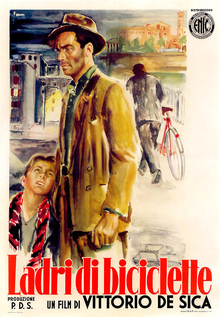Bicycle
Thieves (1948)
Directed by Vittorio De Sica
Screenplay by Cesare Zavattini,
Suso D’Amico, Vittorio De Sica, Oreste Biancoli, Adolfo Franci and Gerardo
Guerrieri, based on the novel by Luigi Bartolini
Runtime: 1 hr, 29 min
In
my hobby of watching classic cinema, one conclusion I have arrived at is that
the most fragile situations are always the most heartbreaking. Whether it’s the car engine sequence in
Charles Burnett’s Killer of Sheep or
the slowly dissolution of the doorman’s psyche in The Last Laugh, nothing brings about depression quite like life
slipping off the tightrope. Today’s
picture, the first picture to ever top the prestigious Sight & Sound poll of the greatest films of all time, most
certainly fits into that particular mold.
The
name of the film is Ladri di biciclette,
literally Bicycle Thieves. Though often translated into English as The Bicycle Thief, that title is a bit
misleading; there is more than one such character in the film. Our protagonist is Antonio Ricci (Lamberto
Maggiorani), a struggling family man in post World War II Rome, has just found
work placing posters around the city. It
has given him the chance to provide for his wife, Maria (Lianella Carell) and
his young son, Bruno (Enzo Staioli). On
first day on the job, however, his bicycle is stolen; unless he can recover it,
he is going to lose the position.
Losing
the bicycle is devastating for Ricci.
That we see the build-up to moment makes it even more wrenching for the
audience. From the Ricci’s cramped
quarters to the throng of people in the opening sequence desperate for work,
the film’s universe is riddled with poverty.
Just acquiring the bicycle involves tremendous sacrifice for the
family. Ricci had previously pawned his
bicycle, so Maria pawns off the bed sheets from her dowry to raise the money to
buy it back. Even then, they don’t get
all that much from it: 7,500 lira, less than what Ricci would make in one month
pasting up posters.
And
then, in one fell swoop, it’s all for naught.
Someone pilfers the bicycle before Ricci can react. It’s a position of hopelessness and weariness
which Maggiorani portrays beautifully.
Despite, like the rest of the cast, being an amateur actor, Maggiorani's performace
is completely convincing. His demeanor
is bleak throughout most of the film, oftentimes frustrated and occasionally
rage-filled. Yet, every once in awhile,
he is able to reach down and find something, even the most insignificant thing,
to smile about.
Equally
as powerful is Staioli as Bruno. Unlike
his father, Bruno has yet to be beaten down by harshness of lower-class
Italy. He’s ecstatic to give his
father’s bike a cleaning before his first day of work, and has the mental
acuity to instantly recall the serial number when they go searching for it in
the markets. This is not to say that
Bruno is never depressed. Far from it—in
fact, he probably has a wider range of emotions than Ricci. He is the mirror for the audience, reacting
to the plight of his father as best as someone his age can. In this sense, then, Bruno is the heart of Bicycle Thieves.
As
wonderful as the two leads are, the real star of the film is post-war
Rome. Virtually the entire city is in
some way desperate. The apartments are
all cramped, the police are unresponsive and the unemployment office is in way
over its head. All of it beautifully
photographed, with intimidating empty space for the exteriors and deep gray
shadings indoors. Some of it borders on
expressionist, but grit underlines nearly every frame. The Rome of Bicycle Thieves is most definitely the place where as stolen bike
really is a matter of life and death.
Of
course, good luck telling the picture’s aristocracy that. Even more heartbreaking than the loss of
Ricci’s bicycle, to me at least, is the indifference of the wealthy. Two instances stand out. First, when Ricci first reports his stolen
bicycle to company, the man in charge just shrugs and tells him to look for it;
when another worker asks what’s been lost, he replies, “Nothing. Only a bicycle.” There’s no reason for the boss to bother
doing much, since there’s no shortage of unemployed men with bicycles. What gets lost, though, is Ricci’s
humanity. Only a bicycle, indeed.
The
second incident, involving Bruno, is even more gut-wrenching. At one of the few happy sequences post-theft,
Ricci and Bruno stop in a restaurant to get food. The clientele is much for refined and the
waiters clearly look down on the two.
But what is most unnerving are the looks that Bruno keeps getting from
the rich family having lunch at the table behind them. Ricci attempts to reassure his son, but their
presence only reminds the father of all the money, of the promise of a stable
life, that the stolen bicycle has robbed him of.
So,
in conclusion: Bicycle Thieves is the
sort of film that, when you've finished watching it, makes you hope somewhere
in the back of your mind that you accidentally walk in front of a speeding
train. When even the momentary reprieves
from the daily grind serve to remind the protagonists that their lives are
broken, you know that the Earth is actually a cold dark place. I cannot stress how moving Bicycle Thieves is as a motion
picture. Just make sure you keep several
boxes of tissues on hand for the last ten minutes. Fair warning to you, there.

No comments:
Post a Comment